八年级英语上册 一般将来时用法与练习 人教版
人教版英语英语一般将来时的用法大全及答案

人教版英语英语一般将来时的用法大全及答案一、初中英语一般将来时1.We ________ a party for Kate. It's supposed to be a surprise.A. were havingB. hadC. will haveD. have had【答案】C【解析】【分析】句意:我们将为凯特举办一个聚会。
这应该是个惊喜。
根据句意语境可知举办聚会这个动作还没有发生,需用一般将来时,故选C。
【点评】考查动词时态辨析题。
熟练掌握时态的用法。
2.— Let's go fishing if it this weekend.— But nobody knows if it .A. is fine; will rainB. will be rain; rainsC. will be fine; will rainD. is fine; rains 【答案】 A【解析】【分析】句意:——如果这个周末晴天我们去钓鱼吧。
——但是没人知道是否会下雨。
第一个空前的if引导条件状语从句,意思是“如果”,从句中用一般现在时表示将来;第二个空前的if引导宾语从句,意思是“是否”,根据从句的tomorrow可知用一般将来时;故选A。
【点评】考查动词的时态。
3.—What is your plan for next weekend, Lingling?—I volunteer work in the museum.A. was doingB. didC. have doneD. am going to do【答案】 D【解析】【分析】句意:——玲玲,你下周末打算干什么?——我要去博物馆做义工。
根据题干中的next weekend,可知此句要用一般将来时,故选D。
【点评】考查一般将来时的基本构成及用法。
4.The old woman believes her children ________ back next year.A. comeB. comesC. will comeD. came【答案】 C【解析】【分析】句意:这个老太太认为她的孩子们明年会回来。
人教版英语八上时态专讲--一般将来时讲义+习题

人教版英语八上时态专讲--一般将来时讲义+习题一般将来时一般将来时表示将来某一时段的动作或状态,或将来某一段时间内经常的动作或状态。
Will+be will+do含义:一般将来时表示将来某一时刻的动作或状态,或将来某一段时间内经常的动作或状态。
结构:①Will/shall+动词原形肯定句:主语+will/shall+动词原形+其他否定句:主语+will/shall+not+动词原形+其他一般疑问句:Will/Shall+主语+动词原形+其他肯定回答:Yes,主语+will/shall;否定回答:No,主语+will/shall not.特殊疑问句:特殊疑问词+一般疑问句②be going to+动词原形肯定句:主语+be(is/am/are)+going to+其他否定句:主语+be(is/am/are)+not+going to+其他一般疑问句:Be(Is/Are)+主语+going to+其他? 肯定回答:Yes,主语+be/否定回答:No,主语+be not.特殊疑问句:特殊疑问词+一般疑问句表示将来的时间状语:tomorrow(明天), next week(下周);in the future(将来);in a year(一年以后)等。
一般将来时由助动词shall(第一人称),will(所有人称)动词原形构成。
美式英语则不管什么人称,一律用will。
或用主语+be动词 + going to 动词(be going to)复习:用法:一般将来时表示将来某一时段的动作或状态,或将来某一段时间内经常的动作或状态。
在英语时态中,"时"指动作发生的时间,"态"指动作的样子和状态。
表示将来的时间状语:tomorrow,the day after tomorrow,tomorrowmorning/afternoon/evening/next/year/week/month/hour/ in+一段时间,in the future等连用。
人教版英语八年级上册Unit6一般将来时语法详解及练习
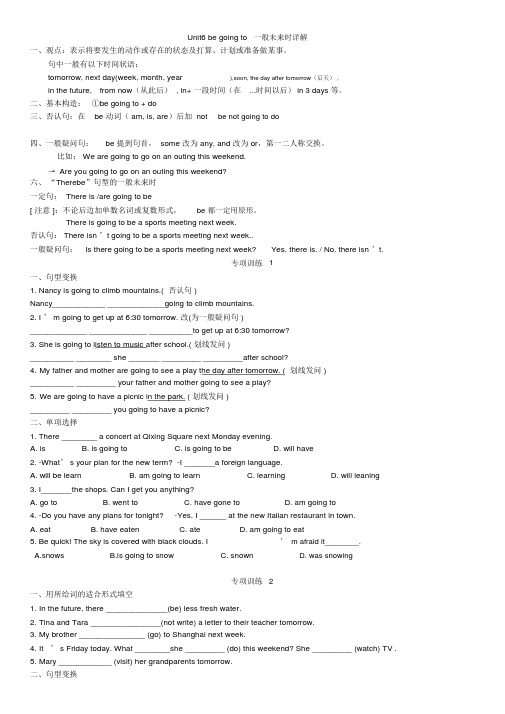
Unit6 be going to一般未来时详解一、观点:表示将要发生的动作或存在的状态及打算、计划或准备做某事。
句中一般有以下时间状语:tomorrow, next day(week, month, year),soon, the day after tomorrow(后天) , in the future, from now(从此后) , in+ 一段时间(在...时间以后) in 3 days 等。
二、基本构造:①be going to + do三、否认句:在be 动词( am, is, are)后加 not be not going to do四、一般疑问句:be 提到句首, some 改为 any, and 改为 or,第一二人称交换。
比如: We are going to go on an outing this weekend.→Are you going to go on an outing this weekend?六、“Therebe”句型的一般未来时一定句: There is /are going to be[ 注意 ]:不论后边加单数名词或复数形式,be 都一定用原形。
There is going to be a sports meeting next week.否认句: There isn ’t going to be a sports meeting next week..一般疑问句:Is there going to be a sports meeting next week?专项训练一、句型变换Yes, there is. / No, there isn ’t. 11. Nancy is going to climb mountains.( 否认句 )Nancy____________ _____________going to climb mountains.2. I ’ m going to get up at 6:30 tomorrow. 改(为一般疑问句 )_____________ _____________ __________to get up at 6:30 tomorrow?3. She is going to listen to music after school.( 划线发问 )__________ ________ she _______ _________ _________after school?4.My father and mother are going to see a play the day after tomorrow. ( 划线发问 )__________ _________ your father and mother going to see a play?5.We are going to have a picnic in the park. ( 划线发问 )_________ _________ you going to have a picnic?二、单项选择1. There ________ a concert at Qixing Square next Monday evening.A. isB. is going toC. is going to beD. will have2. -What’ s your plan for the new term? -I _______a foreign language.A. will be learnB. am going to learnC. learningD. will leaning3. I_______the shops. Can I get you anything?A. go toB. went toC. have gone toD. am going to4. -Do you have any plans for tonight? -Yes, I ______ at the new Italian restaurant in town.A. eatB. have eatenC. ateD. am going to eat5. Be quick! The sky is covered with black clouds. I’ m afraid it________.A.snowsB.is going to snowC. snownD. was snowing专项训练 2一、用所给词的适合形式填空1.In the future, there ______________(be) less fresh water.2.Tina and Tara ________________(not write) a letter to their teacher tomorrow.3.My brother _______________ (go) to Shanghai next week.4.It ’ s Friday today. What ________she _________ (do) this weekend? She _________ (watch) TV .5.Mary ____________ (visit) her grandparents tomorrow.二、句型变换1. Ken is going to keep on writing stories. ( 否认句、一般疑问句、发问Ken _________ _________ going to keep on writing stories._________ Ken ___________ to keep on writing stories?__________ _________ Ken going to ____________?)三、单项选择((((((( () 1. Ann____ mountains tomorrow morning. A. is going to climb B.climb C.climbs D.is climbing ) 2. The girl ______ a new computer for herself next year.A. buyB. buysC. boughtD. is going to buy) 3. ---_______ on Sunday? ---She is going to take guitar lessons.A. What does she doB. When is she going to take guitar lessonsC. How is she going to doD. What is she going to do) 4. My brother is going to _______ an engineer when he ________ up.A. do; growB. do; growsC. be; growD. be; grows)5. My brother is going to _______ a cook when he _______ up.A. do; growB. do; growsC. be; growD. be; grows) 6. What _____ you _____ to do when you _____ high school?A. do; want; finishB. will; want; finishC. are; going; are going to finishD. are; want; are going to finish) 7.The day after tomorrow they ________ a volleyball match.A. will watchingB. watchesC. is watchingD. is going to watch)8. There's going to ____ in tomorrow's newspapers.A. have something newB. have new somethingC. be something newD. be new something。
人教版英语八年级上册Unit7一般将来时语法详解及练习

Unit7 will一般将来时详解一、概念:表示将要发生的动作或存在的状态及打算、计划或准备做某事。
句中一般有以下时间状语:tomorrow, next day(week, month, year…),soon, the day after tomorrow(后天),in the future, from now(从今后),in+一段时间(在...时间之后)in 3 days 等。
二、基本结构:②will+ do.三、否定句:will后加not成will not =won’t。
will not=won’t四、一般疑问句:will提到句首,some改为any, and改为or,第一二人称互换。
五、同义句:be going to = willI am going to go swimming tomorrow. = I will go swimming tomorrow.六、“There be”句型的一般将来时肯定句:There will be+名词=There is/are going to be[注意]:无论后面加单数名词或复数形式,be都必须用原形。
There will be only one country.否定句:There won’t be only one country.一般疑问句:Will there be only one country?Yes,there will./No,there won’t.专项训练1一、单项选择1. I hope you ________a good time this evening.A. haveB. are havingC. will haveD. has2. There________ a basketball match this afternoon.A. will haveB. will beC. hasD. have3. We________to the park if it is fine tomorrow.A. will goB. goC. goesD. went4. The kids may not go to school in the future. They ________at home on computers.A. have studiedB.will studyC. studiedD. studies5. -Shall we hang out in Great Bazzar tomorrow?-I’m afraid not. ________the final game of the World Cup on TV.A. There isB. There will beC. There will haveD. There is going to have二、句型转换1. Students will go to school in the future.(一般疑问句) ________ _______ _______ to school in the future?2.There will be some robots in our homes.(否定句) There _______ ______ _______robots in our homes.3.My sister will go camping with her friends.(否定句) My sister ________ _______camping with her friends.4.Mike will visit his grandparents next weekend.(一般疑问句,肯定回答)_______Mike_______his grandparents next weekend? Yes, ________ _______.5.There will be more wild animals in the forest.(一般疑问句,否定回答)______ _____ ______more wild animals in the forest? No, _______ _______.专项训练2( ) 1. If they come, we ________ a meeting. A. have B. will have C. had D. would have ( ) 2. He ________ her a beautiful hat on her next birthday.A. givesB. gaveC. will givingD. is going to giving( ) 3. He ________ in three days.A. coming backB. came backC. will come backD. is going to coming back( ) 4. ________ a concert next Saturday?A. There will beB. Will there beC. There can beD. There are( ) 5. There ________ a birthday party this Sunday.A. shall beB. will beC. shall going to beD. will going( )7. There ___ a talk show on CCTV 3 at eight tonight.A. will haveB. is going to beC. is havingD. is going to have( )8. I ________ free the day after tomorrow. A. will B. will C. will be D. will am ( ) 9. Mother ________ me a nice present on my next birthday.A. will givesB. will giveC. givesD. give1. Andy will start working when she finishes high school and college.(否定句、一般疑问句、提问)Andy _________ _________ start working when she finishes high school and college.________ Andy _______ working when she finishes high school and college?________ _______ Andy ________ working?2. We will meet at the bus stop at 10:30.(改一般疑问句)_______ ________ meet at the bus stop at 10:30?。
2019人教八年级上册Unit 7单元语法:will引导的一般将来时精讲精练(word, 包含答案)
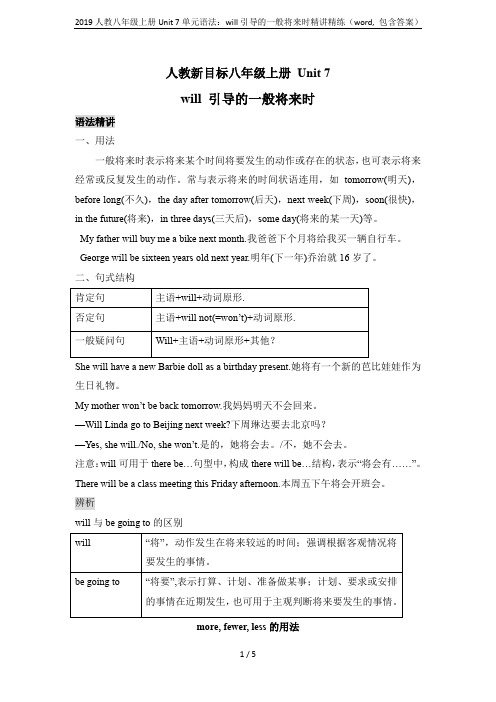
人教新目标八年级上册Unit 7will 引导的一般将来时语法精讲一、用法一般将来时表示将来某个时间将要发生的动作或存在的状态,也可表示将来经常或反复发生的动作。
常与表示将来的时间状语连用,如tomorrow(明天),before long(不久),the day after tomorrow(后天),next week(下周),soon(很快),in the future(将来),in three days(三天后),some day(将来的某一天)等。
My father will buy me a bike next month.我爸爸下个月将给我买一辆自行车。
George will be sixteen years old next year.明年(下一年)乔治就16岁了。
二、句式结构She will have a new Barbie doll as a birthday present.她将有一个新的芭比娃娃作为生日礼物。
My mother won’t be back tomorrow.我妈妈明天不会回来。
—Will Linda go to Beijing next week?下周琳达要去北京吗?—Yes, she will./No, she won’t.是的,她将会去。
/不,她不会去。
注意:will可用于there be…句型中,构成there will be…结构,表示“将会有……”。
There will be a class meeting this Friday afternoon.本周五下午将会开班会。
辨析will与be going to的区别more, fewer, less的用法语法精练一、用所给单词的适当形式填空,使句子或对话完整、通顺。
1. —_____ Tom______ (watch) a soccer game this Saturday?—Maybe. But I’ m not sure about that.2. There_________ (be) a singing competition in our school next Monday.3. — _______ people live________(be) 200 years old?—Yes, they will.4. There _______(be) a book sale in our school next week.5. He________(study) in England in two months.二、单项选择1.—What does he say?—He says there ________ a meeting tomorrow morning.A. isB. hasC. will beD. have2. Michael_________ in a school in Yunnan from February to June next year.A. teachB. taughtC. will teachD. was teaching3. Robots more heavy work for us in the future.A. will doB. didC. have doneD. were doing4. Mr. Smith is busy now. He ___________ to you after work this afternoon, OK?A. talkedB. didn’t talkC. will talkD. won’t talk5. -Maria, what are you doing?-I’m practicing the violin. There ___________an art festival next week at our school.A. will beB. will haveC. wasD. has三、按要求完成下列知子。
最新人教版初二英语一般将来时专题讲练附答案

一般将来时讲解一、概念:表示将要发生的动作或存在的状态及打算、计划或准备做某事。
句中一般有以下时间状语:tomorrow, next day(week, month, year…),soon,the day after tomorrow(后天)等。
二、基本结构:①be going to + do;②will+ do.三、否定句:在be动词(am, is, are)后加not或will后加not成won’t。
例如:I’m going to have a picnic this aftern oon.→ I’m not going to have a picnic this afternoon.四、一般疑问句:be或will提到句首,some改为any, and改为or,第一二人称互换。
例如:We are going to go on an outing this weekend.→ Are you going to go on an outing this weekend?五、同义句:be going to = willI am going to go swimming tomorrow(明天). = I will go swimming tomorrow.六、be going to和will 的区别be going to和will 的用法虽然都表示将来发生动作或情况,但它们的用法是有区别的。
be going to主要用于:1、表示事先经过考虑、安排好打算要做的事情。
E.g What are you going to do today? 今天你们打算做什么?Dad and I are going to see a Beijing opera this afternoon. 今天下午我和爸爸打算去看京剧。
I’m going to play the violin. 我打算拉小提琴She’s going to play the piano. 她打算弹钢琴。
Unit6单元语法一般将来时专项训练人教版八年级英语上册

单元语法:一般将来时1.概念定义:一般将来时表示将来某一时刻的动作或状态,或将来某一段时间内经常的动作或状态。
be going to意为自己打算做某事、计划做某事或者有意做某事。
2.时间标志词:常与一些表示将来的时间状语连用,如:tomorrow(明天),next week(下周),next year (明年),in the future(将来),in +一段时间等。
3.基本结构:be going to+动词原形(be 动词随主语不同可变为is,am,are)4.句式结构变化:肯定句:主语+be going to do+其他Eg: He is going to take acting lessons.否定句:主语+be not going to do +其他Eg: He isn’t going to take acting lessons.一般疑问句:Be +主语+going to do +其他?肯定回答:Yes, 主语+be.否定回答:No, 主语+be not.Eg: Is he going to take acting lessons? Yes, he is. / No, he is not.【基础训练】Ⅰ. 用be going to的正确形式填空1. I _______________(watch) a film tonight.2. Sam _______________(buy) a new car next week.3. Nancy’s car broke down. She _______________(work) by subway.4. They _______________(have) a party tomorrow evening.5. He ___________________ (take) an art lesson tomorrow.Ⅱ. 句型转换1. —Are you going to clean your room later? (补全肯定答语)—Yes, _______ _______.2. Helen is going to make breakfast for her parents. (改为否定句)Helen _______ _______ _______ _______ breakfast for her parents.3. Rick is going to swim this afternoon. (改为一般疑问句)_______ Rick _______ _______ _______ this afternoon?4. She is going to be a singer when she grows up. (对划线部分提问)_______ _______ she _______ _______ _______ when she grows up?5. I’m going to meet Tim in the restaurant. (对划线部分提问)_______ _______ you _______ _______ _______ Tim?【综合训练】单项选择1. —What is your plan for next weekend?—I _______ volunteer (志愿者) work in the park.A. was doingB. didC. doD. am going to do2. Look at those black clouds! It _______.A. rainsB. rainedC. is going to rainD. is raining3. —Ann is in hospital. I _______ her.—Oh, really? I _______ know that. Let’s go together.A. am going to visit; didn’tB. visited; don’tC. am going to visit; don’tD. visited; didn’t4.—There _______ a book sale in front of the school library this afternoon. Howabout going there after class?—Good idea.A. isB. wasC. is going to beD. is going to have5. Cindy wants to choose a gift for her mother. So she _______ to the shopping centerafter school.A. wentB. didn’t goC. is goingD. isn’t going6. There is going to ________ a meeting the day after tomorrow(后天).A.have B.be C.has D./7. ________ your cousin ________ me next week?A.Is; going to visit B.Does; going to visitC.Is; goes to visit D.Does; goes to visit8. —Are there any robots in your home now?—No, but there ________ a lot of robots in people’s homes ________.A.will be, 100 years ago B.are going to have, in 100 years C.are going to be, in 100 years9. There ________ two new movies in Sunshine Movie Theater tonight.A.is going to have B.will have C.is going to be D.are going to be 10. Look! It is dark outside. I think it ________ soon.A.is going to rain B.rains C.is raining D.rained。
2020暑假预习:初中英语8年级上册unit7 语法专项---含will的一般将来时 (含习题)

unit7 语法专项---含will的一般将来时(含习题)一般将来时Simple Future Tense概念:表示将来某一时刻的动作或状态,或将来某一时间内经常发生的动作或状态。
构成:will/shall+动词原形will在名词或代词后常简缩为’ll,will not常简缩为won’t。
一般说来,shall用于第一人称,will用于第一、二、三人称。
在现代英语中,shall常用will代替,可以说I will go. /We will go.在疑问句中,主语为第一人称(I和we)时,常用助动词shall.时间标志词:in+一段时间,tomorrow,next year/week/month/hour/day,in the future, soon, from now on, some day,this year/term/weekWill people use money in100 years?100年以后人们还会使用钱吗?(选自人教版教材unit7)句式变化:一般将来时的用法:①表示将要发生的动作或存在的状态,常与表示将来的时间状语连用。
如: next week, tomorrow, this afternoon, in a month, soon 等I will go swimming this afternoon.今天下午我将去游泳。
---Will you be free tomorrow?你们明天有空吗?---Yes, we will.是的,我们有空。
①表示将来经常发生的动作。
From now on I will come for the newspaper every Monday.从现在起每周一我会来取报纸。
③一般现在时表将来:1).表示按规定或时间表预计要发生的动作,用一般现在时表将来,这样的动词有start,leave, come, go等The term starts on September 1st 这个学期将于9月1日开学。
初中英语 人教版八年级上册语法专项-一般将来时讲解+时态混合练习题(含答案)

一般将来时讲解与时态混合练习题“be going to+动词原形”是一般将来时的一种表达形式,表示将要发生的动作或情况,be动词随主语的人称和数的变化而变化。
1.肯定句:主语+be going to+动词原形+其他2.否定句:主语+be not going to+动词原形+其他.3.一般疑问句:Be+主语+going to+动词原形+其他?肯定回答:Yes,主+be.否定回答:No,主语+be not.4.特殊疑问句:疑问词+be+主语+going to+动词原形+其他?用法:(1)表示将要发生的动作或安排,或打算、计划、决定要做的事。
(2)表示主语根据当前的情况做出的预测。
通常是有迹象表明某事即将发生,表达说话人较肯定的判断,指即将发生或肯定要发生的事,常用于I'm sure,I'm afraid或I think等后面。
(3)常与be going to连用的时间状语be going to 表达的是未发生的动作,因此常与一些表示将来的时间状语连用。
例如:tomorrow,this evening,next month,in three weeks等。
有时也可与before, after等引导的时间状语从句连用。
一般将来时1)一般将来时的构成:1. 助动词will(shall)+动词原形2. am / is / are+going to +动词原形2)一般将来时的用法:1.将要发生的动作。
例如:I will leave for Beijing tomorrow.2.将要存在的状态。
例如:This time next year I will be in Japan. Where will you be?3.打算要做的事。
例如:Are you going to watch the film on television tonight?3)常用于一般将来时的时间状语:tomorrow、next week、in 2008等。
人教版英语八年级上册Unit 6-7Grammar一般将来时语法讲解+练习(含答案)

人教版八年级上册Unit 6 - 7 Grammar一般将来时姓名:_________定义表示将来某一时段的动作或状态;表示将来某一段时间内经常的动作或状态。
例:1)She will have a daughter. 她就快有个女儿了。
2)Call me this evening. I’ll be at home. 今晚给我打电话,我会在家。
结构英语时态通过谓语动词的变形来体现,一般将来时的谓语构成有以下几种情况:will + V原(该结构表示将来某个时间将要发生的动作或状态)【注1】will可以缩写为’ll,如:I will = I’ll he will = he’ll【注2】will不涉及第三人称单数的变形,只有一种形式,后面加动词原形。
例:I will visit Mr. Brown next week. 下周我将去拜访布朗先生。
He will go to Beijing next year. 他明年要去北京。
be going to + V原(该结构表示事先考虑过的将要发生的动作,或已有迹象表明将要发生的某事,意为“打算”、“就要”)例:There is going to be a basketball match tomorrow. 明天会有一场篮球比赛。
We’re going to go on vacation in Sanya this winter. 这个冬天我们计划去三亚度假。
There are lots of dark clouds. It is going to rain. 天上乌云密布,快要下雨了。
be doing,现在进行时表将来。
表示位置转移的动词(如go, come, leave, start, arrive等),可以用现在进行时表将来。
例:They’re leaving for Chongqing. 他们即将前往北京。
The bus is coming. 公交车就要来了。
一般将来时讲义和翻译练习人教版英语八年级上册
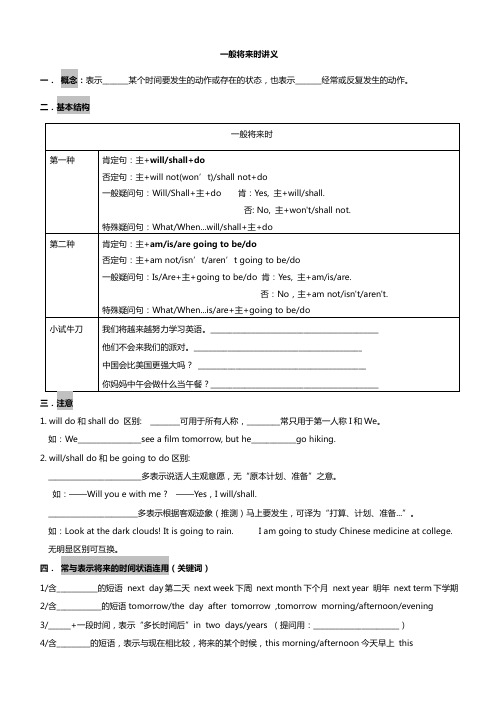
一般将来时讲义一.概念:表示_______某个时间要发生的动作或存在的状态,也表示_______经常或反复发生的动作。
二.基本结构1.will do和shall do 区别: ________可用于所有人称,_________常只用于第一人称I和We。
如:We_________________see a film tomorrow, but he____________go hiking.2.will/shall do和be going to do区别:_________________________多表示说话人主观意愿,无“原本计划、准备”之意。
如:——Will you e with me ? ——Yes,I will/shall.________________________多表示根据客观迹象(推测)马上要发生,可译为“打算、计划、准备...”。
如:Look at the dark clouds! It is going to rain. I am going to study Chinese medicine at college. 无明显区别可互换。
四.常与表示将来的时间状语连用(关键词)1/含___________的短语next day第二天next week下周next month下个月next year 明年next term下学期2/含____________的短语tomorrow/the day after tomorrow ,tomorrow morning/afternoon/evening3/______+一段时间,表示“多长时间后”in two days/years (提问用:_______________________)4/含_________的短语,表示与现在相比较,将来的某个时候,this morning/afternoon今天早上thisWednesday/weekend这周三/末5/_________ 引导的表示将来的时间状语从句What will you do when he grows up?6/________ ________(还有多久)问句中How soon will he go home? (回答用_________+一段时间)7/ 单个的短语soon(不久)tonight(今晚)some day(将来的某一天)one day(将来的某一天)in the future(在未来)before long (不久后)from now on(从现在开始)8/注意部分时间词要根据语境来判断是否是将来。
人教版新目标八年级上册英语语法知识及练习

人教版新目标八年级上册英语语法知识点精讲+练习(一)一般将来时一般将来时表示将来某个时间要发生的动作或者存在的状态。
通常与表示将来的时间状语连用,如tomorrow, the day after tomorrow, next year, next month, next week, in 100 years等。
be going to do(动词原形)结构:表示打算、准备做的事情或者肯定要发生的事情。
如:It is going to rain.will do结构表示将来的用法:1. 表示预见Do you think it will rain? You will feel better after a good rest.2. 表示意图I will borrow a book from our school library tomorrow.What will she do tomorrow?基本构成如下:一般疑问句构成:(1)will+主语+do…? Will Sarah come to visit me next Sunday?(2)there be 结构的一般疑问句:Will there + be …?Will there be fewer trees? Yes, there will. / No, there won’t否定句构成:will + not (won’t)+doSarah won’t come to visit me next Sunday.特殊疑问句构成:特殊疑问词+will+主语+…?What will Sarah do next Sunday?根据例句,用will改写下列各句例:I don’t feel well today. (be better tomorrow)I’ll be better tomorrow.1. Gina has six classes today. (have a lot of homework tonight)_____________________________2. I’m tired now. (sleep later)_____________________________3. My parents need a new car. (buy one soon)_____________________________4. We can’t leave right now. (leave a little later)_____________________________5. The weather is awful today. (be better tomorrow)_____________________________答案:1. She’ll have a lot of homework tonight.2. I’ll sleep later.3. They’ll buy one soon.4. We’ll leave a little later.5. Maybe it’ll be better tomorrow.(二)should的用法:should用来提出建议和忠告,后边加动词原形,否定句直接在should后边加not.例如:I think you should eat less junk food.我认为你应该少吃垃圾食品。
Unit 7【刷语法】一般将来时will(重点语法提升练)-八年级英语上册单元模块满分必刷题(人教
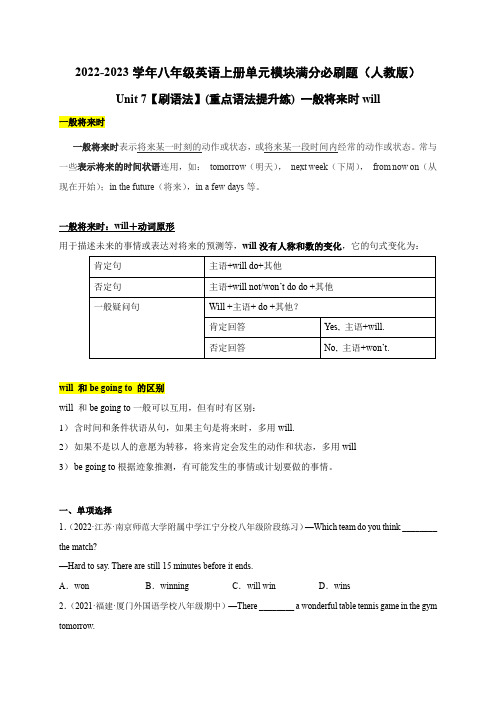
2022-2023学年八年级英语上册单元模块满分必刷题(人教版)Unit 7【刷语法】(重点语法提升练) 一般将来时will一般将来时一般将来时表示将来某一时刻的动作或状态,或将来某一段时间内经常的动作或状态。
常与一些表示将来的时间状语连用,如:tomorrow(明天),next week(下周),from now on(从现在开始);in the future(将来),in a few days等。
一般将来时:will+动词原形用于描述未来的事情或表达对将来的预测等,will没有人称和数的变化,它的句式变化为:will 和be going to 的区别will 和be going to一般可以互用,但有时有区别:1)含时间和条件状语从句,如果主句是将来时,多用will.2)如果不是以人的意愿为转移,将来肯定会发生的动作和状态,多用will3)be going to根据迹象推测,有可能发生的事情或计划要做的事情。
一、单项选择1.(2022·江苏·南京师范大学附属中学江宁分校八年级阶段练习)—Which team do you think ________ the match?—Hard to say. There are still 15 minutes before it ends.A.won B.winning C.will win D.wins2.(2021·福建·厦门外国语学校八年级期中)—There ________ a wonderful table tennis game in the gym tomorrow.—How wonderful! Let’s go together.A.is going to have B.will be C.will have3.(2021·江苏扬州·八年级期中)—Dad, don’t smoke (抽烟) any more. It’s bad for your health.—OK, I ________.A.won’t B.do C.don’t D.will4.(2021·江苏·淮安市淮安区教师发展中心学科研训处八年级期中)I hope Lily ________ to my birthday party next week.A.to come B.come C.will come D.comes5.(2022·湖北武汉·八年级期末)—The students are excited about ________ for the coming trip.—It’s natural for them to talk with excitement.A.what will they do B.where they went C.how will they go there D.who will go with them 6.(2021·北京市陈经纶中学八年级期中)Tom and Mary ________ to China next month.A.come B.came C.coming D.will come7.(2022·江苏·八年级课时练习)—Max, ________afraid of speaking in front of people. You’re the best.—OK, I ________.A.don’t be; will B.don’t be; won’t C.not be; will D.not be; won’t8.It ________ winter soon, so we will buy some warm clothes.A.is B.are C.will be D.can be9.I don’t know if I ________ free tomorrow. If I ________ free, I will go to the bookstore.A.am; am B.will be; will be C.will be; am D.am; will be10.Nobody knows if the editor ________ tomorrow because the temperature will drop ________ -10℃. A.comes; to B.will come; by C.will come; to D.comes; by11.—Will Amy go skiing with us this Saturday?—Sorry, I don’t know if she ________.A.will go B.goes C.went D.was going12.I hope you ________ yourself at the party this Sunday.A.are enjoy B.will enjoyC.to enjoy D.enjoying13.—What ________ you ________ tomorrow afternoon?—________ a football match. I want to watch it.A.are; going to do; There will haveB.will; do; There will going to beC.will; do; There is going to beD.will; do; There have14.—Will people build more buildings in their hometown?—No, they __________.A.can’t B.don’t C.won’t D.aren’t15.—Linda, what are you doing?—I’m practicing the violin. There ________ an art festival in our school next week.A.will be B.will have C.was D.has16.—Will you go to the movies with Katie tonight?—________. I have to do my homework tonight.A.Yes. I will B.No, I won’t C.Yes, I do D.No. I don’t17.There are so many problems, but I’m sure he ________ all of them in two days.A.solves B.is solving C.solved D.will solve18.—Did you clean your room this morning?—No. But I ________ it at once.A.cleaned B.am cleaning C.will clean D.clean19.—What’s your prediction about the future?—I think there ________ more people and ________ trees.A.will have; fewer B.will have; less C.will be; fewer D.will be; less20.—Billy, what will you do to help with housework this winter vacation?—I think I ________ the dishes.A.do B.did C.am doing D.will do21.Stop smoking, Joe! You ________ yourself if you keep on doing it like that.A.killed B.kill C.will kill D.are killing 22.(2021·黑龙江哈尔滨·八年级单元测试)I’m not sure if you ______ free tomorrow. If you are free, let’s ______ the different kinds of resolutions.A.are, discuss about B.will be, discuss aboutC.will be, discuss23.—Will you join us?—________.A.No, I will B.Of course, I will C.I hope not D.Yes, I do 24.(2022·全国·八年级期末)—Do you know when he ________ the work?—Sorry, I don’t know. But I think when the work ________, he will let me know.A.will finish; will be finish B.finishes; finishesC.finishes; will finish D.will finish; is finished25.Don’t worry. We ________ up with others soon.A.is catching B.caught C.will catch D.catches二、完成句子26.(2022·江苏·南京市第十二初级中学八年级期中)比赛将在南京奥体中心举行。
人教版英语八年级上册 Unit6-7语法重点:一般将来时_专项讲解与练习 (有答案)
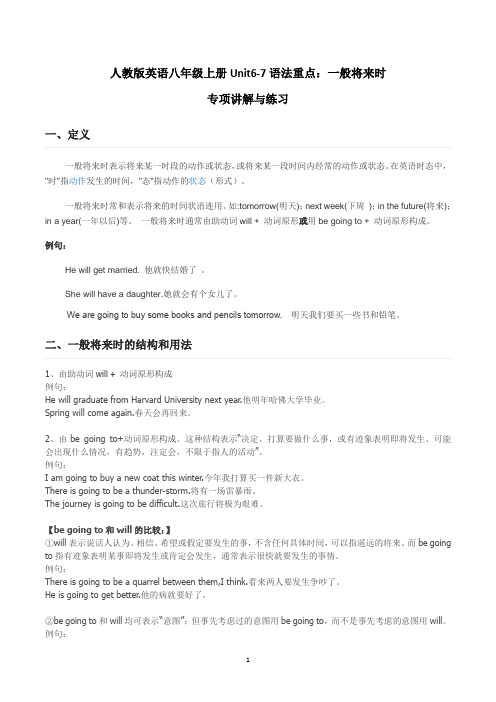
人教版英语八年级上册Unit6-7语法重点:一般将来时专项讲解与练习一般将来时表示将来某一时段的动作或状态,或将来某一段时间内经常的动作或状态。
在英语时态中,"时"指动作发生的时间,"态"指动作的状态(形式)。
一般将来时常和表示将来的时间状语连用。
如:tomorrow(明天);next week(下周);in the future(将来);in a year(一年以后)等。
一般将来时通常由助动词will + 动词原形或用be going to + 动词原形构成。
例句:He will get married. 他就快结婚了。
She will have a daughter.她就会有个女儿了。
We are going to buy some books and pencils tomorrow. 明天我们要买一些书和铅笔。
1、由助动词will + 动词原形构成例句:He will graduate from Harvard University next year.他明年哈佛大学毕业。
Spring will come again.春天会再回来。
2、由be going to+动词原形构成。
这种结构表示“决定、打算要做什么事,或有迹象表明即将发生、可能会出现什么情况,有趋势,注定会,不限于指人的活动”。
例句:I am going to buy a new coat this winter.今年我打算买一件新大衣。
There is going to be a thunder-storm.将有一场雷暴雨。
The journey is going to be difficult.这次旅行将极为艰难。
【be going to和will的比较:】①will表示说话人认为、相信、希望或假定要发生的事,不含任何具体时间,可以指遥远的将来。
而be going to指有迹象表明某事即将发生或肯定会发生,通常表示很快就要发生的事情。
人教版英语八年级上册 Unit6-7语法重点:一般将来时_专项讲解与练习 (有答案)

人教版英语八年级上册Unit6-7语法重点:一般将来时专项讲解与练习一般将来时表示将来某一时段的动作或状态,或将来某一段时间内经常的动作或状态。
在英语时态中,"时"指动作发生的时间,"态"指动作的状态(形式)。
一般将来时常和表示将来的时间状语连用。
如:tomorrow(明天);next week(下周);in the future(将来);in a year(一年以后)等。
一般将来时通常由助动词will + 动词原形或用be going to + 动词原形构成。
例句:He will get married. 他就快结婚了。
She will have a daughter.她就会有个女儿了。
We are going to buy some books and pencils tomorrow. 明天我们要买一些书和铅笔。
1、由助动词will + 动词原形构成例句:He will graduate from Harvard University next year.他明年哈佛大学毕业。
Spring will come again.春天会再回来。
2、由be going to+动词原形构成。
这种结构表示“决定、打算要做什么事,或有迹象表明即将发生、可能会出现什么情况,有趋势,注定会,不限于指人的活动”。
例句:I am going to buy a new coat this winter.今年我打算买一件新大衣。
There is going to be a thunder-storm.将有一场雷暴雨。
The journey is going to be difficult.这次旅行将极为艰难。
【be going to和will的比较:】①will表示说话人认为、相信、希望或假定要发生的事,不含任何具体时间,可以指遥远的将来。
而be going to指有迹象表明某事即将发生或肯定会发生,通常表示很快就要发生的事情。
(完整版)八年级上册一般将来时用法讲解及练习
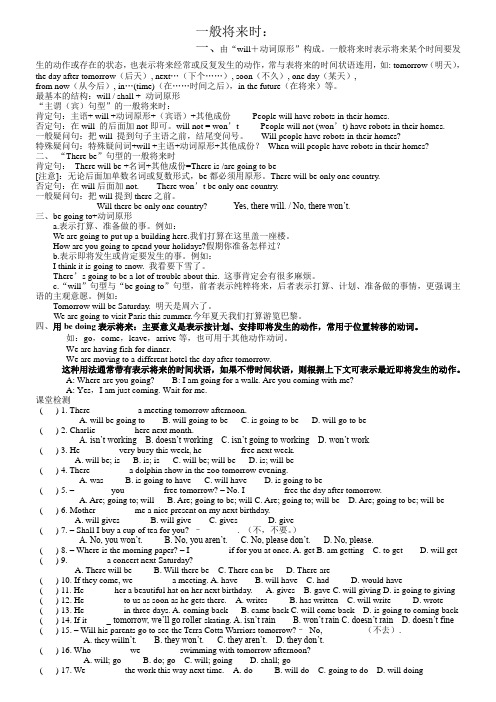
一般将来时:一、由“will+动词原形”构成。
一般将来时表示将来某个时间要发生的动作或存在的状态,也表示将来经常或反复发生的动作,常与表将来的时间状语连用,如: tomorrow(明天),the day after tomorrow(后天), next…(下个……), soon(不久), one day(某天),from now(从今后), in…(time)(在……时间之后),in the future(在将来)等。
最基本的结构:will / shall + 动词原形“主谓(宾)句型”的一般将来时:肯定句:主语+ will +动词原形+(宾语)+其他成份People will have robots in their homes.否定句:在will 的后面加not即可。
will not = won’t People will not (won’t) have robots in their homes.一般疑问句:把will 提到句子主语之前,结尾变问号。
Will people have robots in their homes?特殊疑问句:特殊疑问词+will +主语+动词原形+其他成份?When will people have robots in their homes?二、“There be”句型的一般将来时肯定句:There will be +名词+其他成份=There is /are going to be[注意]:无论后面加单数名词或复数形式,be都必须用原形。
There will be only one country.否定句:在will后面加not. There won’t be only one country.一般疑问句:把will提到there之前。
Will there be only one country? Yes, there will. / No, there won’t.三、be going to+动词原形a.表示打算、准备做的事。
- 1、下载文档前请自行甄别文档内容的完整性,平台不提供额外的编辑、内容补充、找答案等附加服务。
- 2、"仅部分预览"的文档,不可在线预览部分如存在完整性等问题,可反馈申请退款(可完整预览的文档不适用该条件!)。
- 3、如文档侵犯您的权益,请联系客服反馈,我们会尽快为您处理(人工客服工作时间:9:00-18:30)。
一般将来时用法一、一般将来时的动词形式一般将来时表示将来某个时间将要发生的动作或存在的状态,也表示将来经常或反复发生的动作。
一般将来时由助动词shall或will加动词原形构成,shall用于第一人称,will 用于第二、三人称。
但是现在第一人称一般也用will,其区别并不明显。
(或“be going to + 动词原形)常与tomorrow, next… , in (the) future,soon, in five days,in two weeks等连用。
如: I shall not come if it rains tomorrow. 如明天下雨我就不来。
My father will leave for China next week. 我的爸爸下星期要到中国去。
“I’ll, You’ll, He’ll , She’ll , It’ll, We’ll , They’ll …”是简缩形式。
二.一般将来时的句型1.肯定句:主语+shall /will+动词+其他成份The workers will build a new school here next year.工人们明年将在这儿盖一所新学校。
They will go shopping this afternoon. 今天下午他们将要去购物。
We shall have a delicious dinner tonight. 今晚我们将美餐一顿。
We shall be there before dark. 我们天黑前会到达那里。
2.否定句:主语+shall /will+not+动词+其他成份She won’t come back this week.这一周她不回来了。
I will not go shopping one hour later. 一小时之后我不会去购物。
He won’t play football with you before he finishes his work.他干完活后才能跟你踢足球。
3.疑问句:shall /will+主语+动词+其他成份Will you be back in ten minutes? 十分钟后你会回来吗?Will you please open the window? 请你打开窗户好吗?Shall we get something hot to drink? 我们喝一些热饮怎么样?4.特殊疑问句:特殊疑问词+shall /will+主语+动词+其他成份Where will you go next week? 下星期你去哪?What sall I do?我怎么办呢?How many books will they get? 他们将有多少本书?三.will, be going to …, be to…, be about to…的区别1.be going to +不定式,表示将来。
表示打算、准备做的事或即将发生或肯定要发生的事。
be going to和will相比,be going to通常表示主观,will通常表示客观。
What are you going to do tomorrow? 明天你要做什么?Look at the dark clouds, there is going to be a storm. 看看这些黑云,将有一场暴风雨。
It’s going to be a fine day tomorrow.明天将会是个好天。
It is going to rain. 要下雨了。
2.“be to+动词原形”表示按计划要发生的事或征求对方意见。
这种结构表示计划中约定的或按职责、义务要求必须去做的事或即将发生的动作。
We are to have a meeting next Saturday. 下个周日我们有个会。
The boy is to go to school tomorrow. 这个男孩明天要去上学。
Are we to go on with this work? 我们继续干吗?The president is to visit China next week.总统下周来访中国。
3.“be about to+动词原形”表示即将发生的动作,意为:很快,马上。
后面一般不跟时间状语。
这一结构用于表示客观就要发生的事,表示马上就要发生。
一般不再与时间状语连用。
Don’t go out. We’re about to have a meeting. 别出去了,我们很快就开会了。
I was about to start when it began to rain.我刚要出发就下起雨来了。
He is about to leave for Shenyang.他将要离开去沈阳。
We are about to leave. 我们马上就走。
The film is about to begin. 电影马上就要开始了。
四.注意事项1. be about to 不能与tomorrow, next week 等表示明确将来时的时间状语连用。
2. Let’s …的附加疑问通常使用“…, shall we ?”。
Let’s have a rest, shall we?3. 问句是“Shall…?”,答句就用“shall ~”;问句用“Will …?”,答句就用“will ~ ”。
要前后保持一致。
Shall you go to school next week ?Yes, I shall . We’ll have an exam .Will you have an exam tomorrow?Yes, I will. / No, I won’t.一般将来时专项练习一、单项选择。
( ) 1. There __________ a meeting tomorrow afternoon.A. will be going toB. will going to beC. is going to beD. will go to be( ) 2. Charlie ________ here next month.A. isn’t workingB. doesn’t workingC. isn’t going to workingD. won’t work( ) 3. He ________ very busy this week, he ________ free next week.A. will be; isB. is; isC. will be; will beD. is; will be( ) 4. There ________ a dolphin show in the zoo tomorrow evening.A. wasB. is going to haveC. will haveD. is going to be( ) 5. –________ you ________ free tomorrow?– No. I ________ free the day after tomorrow.A. Are; going to; willB. Are; going to be; willC. Are; going to; will beD. Are; going to be; will be( ) 6. Mother ________ me a nice present on my next birthday.A. will givesB. will giveC. givesD. give( ) 7. – Shall I buy a cup of tea for you?–________. (不,不要。
)A. No, you won’t.B. No, you aren’t.C. No, please don’t.D. No, please.( ) 8. – Where is the morning paper?– I ________ if for you at once.A. getB. am gettingC. to getD. will get( ) 9. ________ a concert next Saturday?A. There will beB. Will there beC. There can beD. There are( ) 10. If they come, we ________ a meeting.A. haveB. will haveC. hadD. would have( ) 11. He ________ her a beautiful hat on her next birthday.A. givesB. gaveC. will givingD. is going to giving( ) 12. He ________ to us as soon as he gets there.A. writesB. has writtenC. will writeD. wrote( ) 13. He ________ in three days.A. coming backB. came backC. will come backD. is going to coming back( ) 14. If it ________ tomorrow, we’ll go roller-skating.A. isn’t rainB. won’t rainC. doesn’t rainD. doesn’t fine( ) 15. – Will his parents go to see the Terra Cotta Warriors tomorrow?– No, ________ (不去).A. they willn’t.B. they won’t.C. they aren’t.D. they don’t.( ) 16. Who ________ we ________ swimming with tomorrow afternoon?A. will; goB. do; goC. will; goingD. shall; go( ) 17. We ________ the work this way next time.A. doB. will doC. going to doD. will doing( ) 18. Tomorrow he ________ a kite in the open air first, and then ________ boating in the park.A. will fly; will goB. will fly; goesC. is going to fly; will goesD. flies; will go( ) 19. The day after tomorrow they ________ a volleyball match.A. will watchingB. watchesC. is watchingD. is going to watch( ) 20. There ________ a birthday party this Sunday.A. shall beB. will beC. shall going to beD. will going to be( ) 21. They ________ an English evening next Sunday.A. are havingB. are going to haveC. will havingD. is going to have( ) 22. ________ you ________ free next Sunday?A. Will; areB. Will; beC. Do; beD. Are; be( ) 23. He ________ there at ten tomorrow morning.A. willB. isC. will beD. be( ) 24. ________ your brother ________ a magazine from the library?A. Are; going to borrowB. Is; going to borrowC. Will; borrowsD. Are; going to borrows( ) 25. – Shall I come again tomorrow afternoon?–________ (好的).A. Yes, pleaseB. Yes, you will.C. No, please.D. No, you won’t.( ) 26. It ________ the year of the horse next year.A. is going to beB. is going toC. will beD. will is( ) 27. ________ open the window?A. Will you pleaseB. Please will youC. You pleaseD. Do you( ) 28. –Let’s go out to play football, shall we?– OK. I ________.A. will comingB. be going to comeC. comeD. am coming( ) 29. It ________ us a long time to learn English well.A. takesB. will takeC. spendsD. will spend( ) 30. The train ________ at 11.A. going to arriveB. will be arriveC. is going toD. is arriving二、动词填空。
